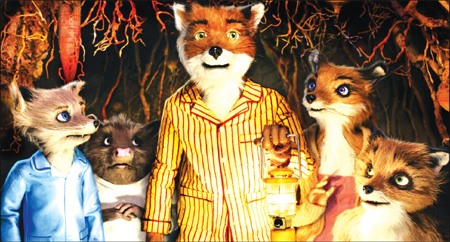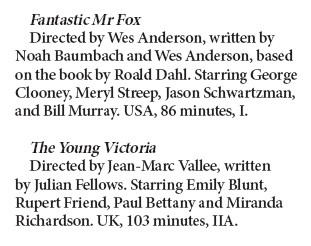Victoria looks royal and Mr Fox is in fact fantastic
Updated: 2010-03-27 07:45
By Elizabeth Kerr(HK Edition)
|
|||||||||
Remember back in the late 1980s when everyone said vinyl was on its way out? I do, and in taking a completely unscientific survey it's clear that hasn't quite come to pass just yet (and yes, I still have a turntable). The cinematic equivalent of the progress debate has hit phase 3. Color was supposed to make black and white obsolete way back in the '30s - but Spielberg, Scorsese, Bergman, and Haneke didn't get the memo. Then television moved in to take over the mantle of film-killer in the '50s and now 3D is allegedly sounding the death knell of 2D cinema. 3D may be the toy of choice for bang-bang masters like Michael Bay, but The Young Victoria and Fantastic Mr Fox prove there's still room for modest tradition when there's a decent story to be told.
It's arguable as to whether fancy technology would do much to heighten the value of the experience in watching a lush period romance like Victoria or the imaginative puppet animation Mr Fox; it probably wouldn't. Both films rely on their images to realize another time or world, and carry the message or narrative in the visuals. One succeeds a little better than the other.
It would be easy to compare Victoria to Elizabeth, what with it being a story about the developmental youth that would create two of England's most notable monarchs. But where the earlier film had wars of conquest and political maneuverings for Elizabeth I to deal with, Victoria is, for the most part, a love story. As the young princess (Emily Blunt) that would go on to become history's longest ruling monarch takes her first tremulous steps on the throne, she is also compelled to choose a husband.
The bulk of the film concentrates on her romance with young Albert (Rupert Friend) and the strain their relationship was initially subjected to. Victoria may have been a great queen but she doesn't make for great drama. There's a goodly amount of head-nodding and voice-over readings of her and Albert's wooing via letters, but it's difficult for director Jean-Marc Vallee and writer Julian Fellows to create much suspense when we know Victoria and Albert live quite happily in the end and went on to found a great museum. The Young Victoria does, however, look superb (not surprisingly the film won an Oscar for costume design). It's impeccably produced, and ultimately manages a stately kind of low-key charm if your expectations are modest.
On the other hand, there is very little to compare to Wes Anderson's adaptation of Roald Dahl's classic book. It's also a simple narrative about a war of attrition that erupts between Mr Fox (smoothly voiced by George Clooney) and a trio of farmers that want him removed from their property - at least on the surface it is. Mr Fox is a reformed chicken thief and a schemer, and he's totally unable to settle down and accept the life he promised Mrs Fox (Meryl Streep) he would lead after she got pregnant. Typical of Anderson (The Royal Tenenbaums), each of the characters faces a nearly existential dilemma and wrestles with their place in the world and unavoidable mortality.
The defining element here is the surreal stop-motion animation that captures Dahl's sneaky sense of humor as well as Anderson's melancholy musings. Though the script (an expansion on the book) occasionally works too hard to be witty, it has a more delicately rendered and empathetic humanity in it than Anderson usually allows to shine through. Mr Fox's struggle to reconcile the trinity of what he wants to do - what he should do, and his responsibilities to his family and community - has a universal ring to it that adults are going to hear loud and clear while the kids with them boggle at the pictures that would probably be irritating in 3D anyway.
Fantastic Mr Fox and The Young Victoria opened in Hong Kong Thursday.


(HK Edition 03/27/2010 page3)